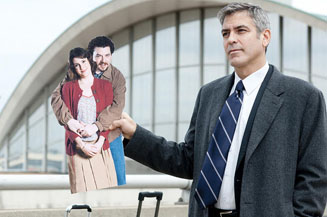|
|
Book vs. Movie: Up in the AirBy Russ BickerstaffDecember 25, 2009
Up in the Air Some time ago, Walter Kirn was making small talk with a man on a plane bound for Los Angeles. He'd asked the man where he was from. The man told him that he wasn't actually from anywhere. He kept his belongings in a storage locker and spent 300 days out of the year on the road. The man told Kirn that there were a lot of people like him. Like any good author, Kirn saw an idea for a novel and promptly wrote Up In The Air - the story of a professional man who spent his life in airports and hotels. The book was a success. Years later, filmmaker Jason Reitman (Thank You For Smoking, Juno) uses the book as a launching point for a film with a decidedly different plot. The film has met with a great deal of acclaim. How do the two compare? The Book Walter Kirn sets up a reasonably interesting first-person narrative from the start. The gentleman in question is Ryan Bingham - a man who lives his life on the road traveling from place to place as a "career transition counselor" - a man who is paid to tell people they've been fired and do so in a way that allows them to best navigate to their next job. Bingham is caught in the perpetual journey of his employment with no real sense of direction beyond two higher priorities: potentially getting hired by a secretive corporation called MythTech and the potential sale of a business allegory book - the type of thing business executive types find inspirational. Among other things, Bingham sees himself as a potential business guru making his fortunes on the executive inspirational lecture circuit. The story lacks any real sense of direction. There are numerous stresses on Bingham, but there's no real sense of organization to it all. And, in a way this works - the aimlessness of the narrative matches the aimlessness of Bingham's journey. The problem is that the narrative itself is pretty lifeless. We get a vivid picture of Bingham's intellectual landscape, but it's not a very interesting place. There are occasionally crisp little bits of description and clever little turns of phrase, but none of the sparkling little elements ever resolve into anything terribly profound. The narrative never develops enough perspective to offer any kind of insight into the nature of the modern nomadic executive lifestyle or the larger corporate culture it fits into.
[ View other columns by Russ Bickerstaff ]
[ View other Book vs. Movie columns ]
[ Email this column ]
|

|
|
|

|
Friday, November 1, 2024
© 2024 Box Office Prophets, a division of One Of Us, Inc.


